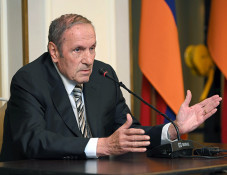
Henk Overbeek on New Global Financial Crisis and East and West Power Shift
There is likely to be another global financial crisis because the underlying causes of the previous crisis (2008) have not been solved, says Dr. Henk Overbeek – Emeritus Professor of International Relations at Free University Amsterdam and expert in International Political Economy in the interview with Panorama.am. \
Commenting on the recent conflicts and wars in the world Dr. Overbeek explains them in the light of the US interests in controlling the conditions of access and keeping the dollar as an international currency. He also comments on the rise of China and India explaining the possibility of the shifting power balance in the world from West to East. Dr. Overbeek also gives some recommendations on Armenia’s economic development.
- Dr. Overbeek, what do you think are the underlying economic reasons for the US expansion of its sphere of influence in the world and the US-Russia confrontation?
- The US continues to keep its dominant position globally but it critically depends on two things – the continued role of the dollar as the primary international currency and the control by the US over access to hydrocarbon energy resources, and these two are interrelated. In general terms it is quite obvious from the history of the last 25 years that all of the wars that we have seen (big wars like the Iraq war or smaller more local conflicts, even in Yemen, in Libya and Chechnya) have a link somehow to the control over the winning and distribution of oil and gas. Given that a large proportion of the world’s proven reserves are in the Middle East and the Caspian Sea region, we can see that this is a hot spot of geo-economic rivalry between the big powers – the US, China, Russia. In all of these instances the effort of the US can be interpreted as being geared towards controlling the conditions of access. It is not that the Americans need these resources per se, but what they need is to be able to control the access and the conditions under which China will have access to these resources. In this case obviously the struggle is between Russia and the US. We have seen that the cases of Chechnya and Georgia and even Yugoslavia are all stories about pipeline connections that are involved there. All these conflicts have a link to the question of how oil and gas are transported from Caspian Sea basin to Western Europe. This is where the primary confrontation is between US and Russia.
Powerful circles in the US have been increasingly concerned with the rise of China and the increasing independent stand of Russia. American policy is informed by the desire to counter and to limit the Russian influence, also in the Middle East.
- To what extant has the last global financial crisis (2008) been dealt with? Is a new financial crisis likely to emerge?
- It is obvious that many of the causes that have led to the financial crisis in 2008 in the advanced capitalist countries (North America, Western Europe, Japan) have not really been resolved; maybe slightly more so in the US than in Europe. Overall we can see that the one big underlying cause that has led to financial crisis has been the build-up of enormous debt – both public and private. And basically the financial crisis has been answered with taking on more debt – partly by shifting the debt, for example there has been a major shift from private to public debt across the whole advanced world because of the bailouts of the banks and insurance companies by the state. Those are all instances where private debt has been transferred to public debt so that now governments are the debtors. On top of that, we have also seen that central banks in their words have been trying to stimulate the economy by massive “quantitative easing”, which is mostly bond buying, that has transferred enormous amounts of fictitious money into the balances of big financial institutions, but it has had practically zero effect on the real economy. By real economy I mean the economy of production and consumption, not the world of financial speculation.
Some steps have been taken in the banking sector mainly, but the underlying phenomenon of exploding debts which is the only way in which advanced capitalist countries can generate any growth now, has not changed. It is a debt-fuelled consumption. So we haven’t got financial crisis resolved, we have just postponed the solution of the crisis. Exactly when or where or how is difficult to predict but if you look at advanced global capitalist world as a whole it’s been inevitable that this is going to result in a new major collapse.
- Given the rapid development of Asia (especially China and India) do you think the world power centre can shift from West towards East in the future?
- If you look at the real economy, at the production, then there was a very clear shift from the old advanced capitalist countries to East Asia – primarily to China, secondarily to India. In terms of global production and global trade this is a very obvious reality. But there are two qualifications here – first, a lot of this growth in China is actually growth in the subsidiaries of Western multinational corporations, so a lot of that growth and export growth is actually controlled by foreign companies. On top of that the Chinese and Indian companies haven’t made much progress in moving up the value chain, in other words in having larger share of the value added in the product chains that they are involved in.
- So China and India are not creating as many value-added products even though their economies are growing?
- No, most of the value-added ends up with the Western multinationals and financial institutions that control the overall process so far. They produce particularly goods that are circulating in the global economy. The industrial production has shifted very heavily to China and to East Asia, but most of the final profits end up with the Western multinational corporations and financial institutions that are at the apex of the value chain. These are two contradictory aspects of the same process.
So, yes in terms of production there is a very clear, strong and sustained shift towards East Asia, but in terms of who ultimately profits from this and who controls the process the picture is much more complex and the power position of the dominant Western interest is much stronger than it would appear from data on production only.I would say at this point in time those dominant Western corporations still control most of the technology – research and development, they control the financial cycles, which enables them to siphon off most of the value added in the global economy. So the value-added is produced in the East but is appropriated in the West.
At the same time however the spending on research and development is increasing much faster in East Asia now, so they could be catching up. There are all kinds of indications that the current situation could change, but those changes will take a long time, because they are very path-dependent – this is not something you can change overnight, because the rules of the game are still dictated by the West.
- Dr. Overbeek, what do you think would be the best strategy for Armenia to protect itself in the face of global financial challenges and to develop economically?
- There are a couple of lessons for a developing country which doesn’t have natural resources (this is by the way a good thing because most developing countries with lots of natural resources are not necessarily very happy). First you should try not to fall into the trap of submitting to the extreme free trade discourse of the IMF and the World Bank and so on, because that has never done developing countries much good in the longer term. Second, there needs to be an important role for a state–coordinated industrial and development policy. Third, there are niches where Armenia could probably make some progress such as developing the tourism sector, it could also probably develop some niches in high-tech sectors; also the very high level of education in Armenia is an asset that could be mobilized. Armenia could also mobilize resources of Armenians in the Diaspora, provided that those can be concentrated and put to use in a strategic plan for the future of Armenia rather than in the form of private donations here and there.
Interview by Nvard Chalikyan
Newsfeed
Videos






























